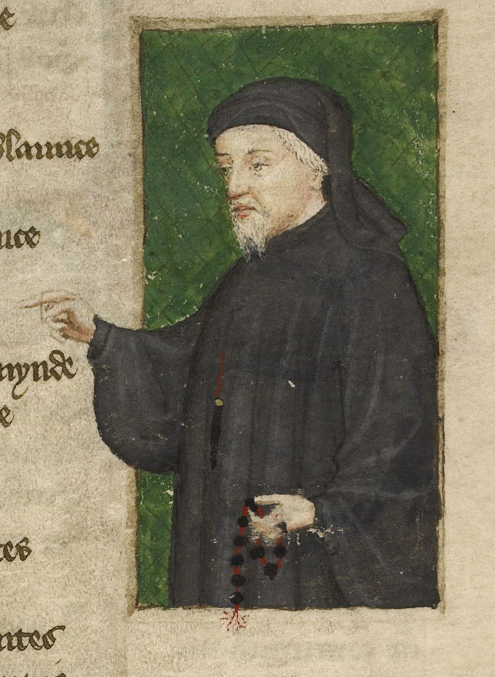
Geoffrey Chaucer was known as the Father of English Literature. This is obviously a topic that is only important to English speaking countries, but he was a significant force in the revitalization of English after the Norman invasion of England. Chaucer wasn’t the only writer that was operating at that time, but he was even known as the father of modern English by his contemporaries, so there was something special about him. Many experts say that you couldn’t imagine the history of the English language without Chaucer in it. English would most likely have evolved, but it might have taken longer and the English I am using now might have been very different. Almost immediately after he died, a school of Chaucerians sprang up to imitate his style.
Chaucer’s life is very well documented because he was a public servant and because he was prominent in the courts of several kings. There are over 500 documents about him. However, there are no documents that show his birth or education. He was probably born in London in 1340 and his family seem to have been wealthy. His father was a wine merchant and Geoffrey Chaucer had a good education. There is no evidence for this other than his writing, which demonstrates a knowledge of languages, histories, and literature. The first record about him is in 1357, when he became a page to the Countess of Ulster. He seems to have got the job thanks to his father and it would have been his first foot on the rung of a career in public service. He ended up in the army and was captured in France before being freed. Over the next ten years he worked his way up in society, training in law, becoming a diplomat, holding various roles at court, getting married, and writing. He became comptroller of customs for the port of London in 1374. He produced several poems during these years, the most famous of which is Troilus and Criseyde, a retelling of a love story set in the Trojan war in Middle English. Critics say that this is probably his best work, but it is not as well known as his more famous work.
Chaucer probably started writing the Canterbury Tales in late 1380. His wife had died, and his fortunes had risen and fallen as different kings vied for the throne. By the 1390s, he had been attacked in his job and had become the subforester of the king’s park. This may have given him the time to concentrate on his writing because he managed to write 24 parts of his Canterbury Tales, the poems that he would be most remembered for. In the prologue to the takes, Chaucer says that he plans to write 120 stories, but he died in 1400, after he had finished only 24 of them.
So, why is Geoffrey Chaucer known as the father of English literature? It is partly because of what he wrote, but also because of the way he wrote it and the language he wrote it in. Let’s look at the language first. English is obviously a mix of different languages. Before the Romans invaded, the main language was Celtic. Once the Romans arrived, Latin took over as the language of government and the rich. When the Romans left in the 5th century, the Anglo-Saxons began to invade and added their languages into the mix, gradually evolving into Old English. When the Anglo-Saxons became Christians, Latin came back with the church, which is the main reason why English is written with the alphabet and not with runes. Then, in 1066, the Normans under William the Conqueror invaded England and within a few years, the language of government and the wealthy was French. Old English was pushed back to the poor classes. Unlike many invading countries, the Normans didn’t suppress English, and it continued to evolve. By 1150, Old English had become Middle English. If you see a passage of Old English (The first lines of Beowulf: Hƿæt! ƿē Gār-Dena in ġeār-dagum, þēod-cyninga, þrym ġefrūnon, hū ðā æþelingas ellen fremedon), you cannot read it. However, if you see a passage of Middle English (The first lines of the Canterbury tales: Whan that Aprill with his shoures soote the droghte of March hath perced to the roote,), you can understand far more of it.
Chaucer was alive during the beginnings of Middle English and he did what many other poets were not doing, he used Middle English to write with. Most poets wrote in Latin or French or Italian. Chaucer used Middle English and he wrote the way people spoke. He wrote with a general audience in mind, and he wrote in the language they would understand. His books were copied and spread, and he played a large part in standardizing Middle English. This was limited because books had to be copied by hand. The first folios of Chaucer’s works were printed on the printing press in 1478 by William Caxton, but Chaucer had been dead for 78 years by then. Still, he was the first person to use the English language people were speaking to write in and he started a tradition that set English on a different path. And this is what I learned today.
Image By Unknown author – http://www.courses.fas.harvard.edu/~chaucer/canttales/sirthop/hoccport.htm, Public Domain, https://commons.wikimedia.org/w/index.php?curid=47359536
Sources
https://en.wikipedia.org/wiki/Geoffrey_Chaucer
https://en.wikipedia.org/wiki/The_Canterbury_Tales
http://scihi.org/geoffrey-chaucer/
https://writersinspire.org/content/geoffrey-chaucer-father-modern-english
https://www.jstor.org/stable/41409277
https://www.britannica.com/biography/Geoffrey-Chaucer/Diplomat-and-civil-servant
https://www.oed.com/discover/old-english-an-overview
https://en.wikipedia.org/wiki/Old_English
https://chaucer.fas.harvard.edu/pages/general-prologue-0
